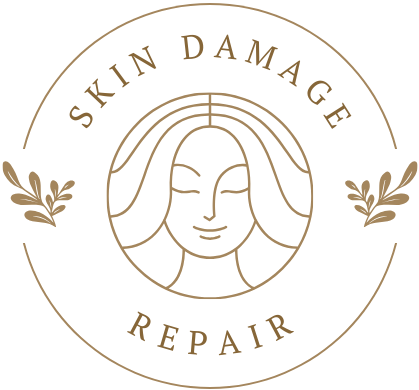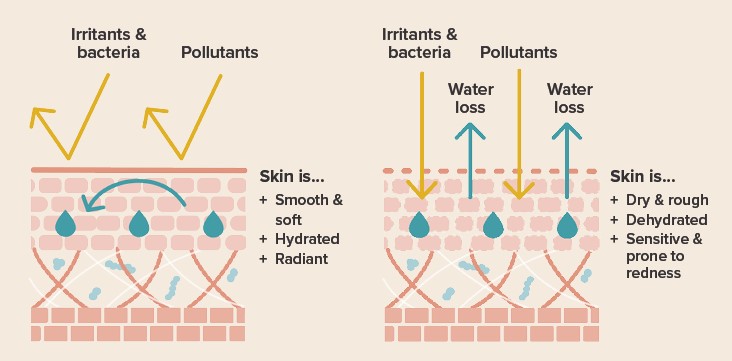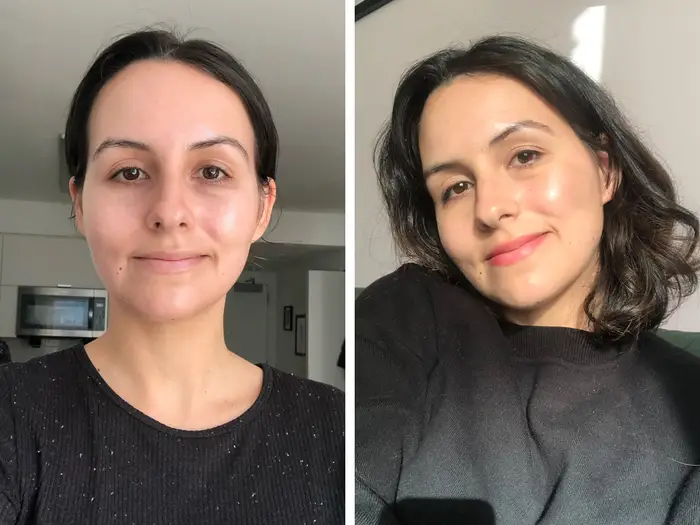The skin barrier, also known as the stratum corneum, is the outermost layer of the epidermis, the top layer of the skin. It acts as a protective shield, safeguarding the body from environmental threats, such as harmful UV rays, pollutants, and pathogens. The skin barrier is composed of tightly packed corneocytes (flattened dead skin cells) held together by a lipid matrix consisting of ceramides, cholesterol, and fatty acids.
This intricate structure plays a crucial role in maintaining the skin’s overall health and integrity. One of its primary functions is regulating moisture levels by preventing excessive water loss from the deeper layers of the skin, a process known as transepidermal water loss (TEWL). A well-functioning skin barrier helps retain moisture, keeping the skin hydrated and preventing dryness and irritation.
Additionally, the skin barrier serves as a physical and chemical defense system, shielding the body from external aggressors. Its slightly acidic pH, known as the acid mantle, creates an inhospitable environment for harmful microorganisms, reducing the risk of infections. The skin barrier also acts as a barrier against allergens, irritants, and pollutants, preventing their penetration into the deeper layers of the skin.
Find More Valuable Content On: Skindamagerepair.com
The Importance of a Healthy Skin Barrier
The skin barrier, also known as the stratum corneum, is the outermost layer of the skin and serves as a crucial protective shield. A healthy, intact skin barrier is essential for maintaining overall skin health and preventing various skin issues. Here are some key benefits of a robust skin barrier:
-
Prevents Transepidermal Water Loss (TEWL): The skin barrier plays a critical role in regulating moisture levels within the skin. It prevents excessive water loss from the deeper layers of the skin, helping to maintain proper hydration and preventing dryness, flakiness, and a tight, uncomfortable feeling.
-
Protects Against Environmental Damage: The skin barrier acts as a physical and chemical barrier, shielding the deeper layers of the skin from harmful environmental factors such as pollutants, UV radiation, and allergens. A compromised barrier leaves the skin vulnerable to oxidative stress, premature aging, and inflammation.
-
Reduces Skin Sensitivity and Irritation: An intact skin barrier helps prevent irritants, allergens, and microbes from penetrating the skin and causing inflammation, redness, and irritation. This is particularly important for individuals with sensitive skin or conditions like eczema and rosacea.
-
Maintains Skin Integrity: The skin barrier plays a crucial role in maintaining the structural integrity of the skin. It helps prevent the breakdown of collagen and elastin fibers, which can lead to premature aging and the formation of fine lines and wrinkles.
Causes of a Damaged Skin Barrier
The skin barrier can be compromised by various environmental, lifestyle, and internal factors. Environmental factors like pollution, extreme weather conditions, and excessive UV exposure can disrupt the skin’s protective layer. Pollution particles and harmful gases can penetrate the skin, causing inflammation and oxidative stress, while UV radiation can damage the skin’s DNA and accelerate aging.
Lifestyle factors also play a significant role in skin barrier health. A poor diet lacking essential nutrients can impair the skin’s ability to repair and renew itself. Chronic stress can trigger inflammatory responses and disrupt the skin’s natural processes. Smoking and excessive alcohol consumption can also contribute to a weakened skin barrier.
Certain skin conditions, such as eczema, dermatitis, and psoriasis, are characterized by an impaired skin barrier. These conditions can cause the skin to become dry, itchy, and prone to irritation, further exacerbating the barrier dysfunction.
The use of harsh skincare products, including those containing harsh surfactants, alcohols, and fragrances, can strip the skin of its natural oils and disrupt the barrier function. Over-exfoliating or using abrasive scrubs can also damage the skin’s protective layer.
Finally, the natural aging process can lead to a thinning of the skin and a decreased production of lipids, resulting in a weakened skin barrier. As we age, the skin’s ability to repair and renew itself becomes less efficient, making it more susceptible to damage and dehydration.
Signs of a Compromised Skin Barrier
One of the most obvious signs of a damaged skin barrier is dryness and roughness. When the barrier is compromised, the skin loses its ability to retain moisture effectively, leading to a tight, dehydrated feeling and a rough, uneven texture. Flakiness and visible scaling or peeling are also common indicators of barrier impairment.
Redness and inflammation are other telltale signs of a compromised skin barrier. The protective barrier’s function is to shield the skin from external aggressors, and when it’s weakened, the skin becomes more susceptible to irritation and inflammation from environmental factors, cosmetic products, or even the body’s own immune response.
Increased sensitivity and reactivity are also common symptoms of barrier damage. The skin may become more reactive to products or ingredients that were previously well-tolerated, leading to stinging, burning, or itching sensations upon application. This heightened sensitivity can also manifest as increased susceptibility to irritants like harsh weather conditions, pollution, or even harsh fabrics.
In some cases, a damaged skin barrier can exacerbate or trigger certain skin conditions. For individuals with eczema or atopic dermatitis, a compromised barrier can lead to flare-ups, characterized by red, inflamed, and itchy patches of skin. Those with rosacea may experience increased flushing, redness, and sensitivity when the skin barrier is impaired.
Overall, the signs of a compromised skin barrier can range from mild dryness and roughness to more severe symptoms like intense redness, inflammation, and sensitivity. Recognizing these signs is crucial for taking the necessary steps to repair and strengthen the skin’s protective barrier.
Repairing the Skin Barrier
Restoring a damaged skin barrier requires a multi-pronged approach that addresses both internal and external factors. Lifestyle changes play a crucial role in supporting the skin’s natural healing process. A nutrient-rich diet abundant in antioxidants, essential fatty acids, and vitamins can aid in strengthening the skin’s defenses from within. Adequate hydration and stress management techniques, such as meditation or yoga, can also contribute to overall skin health and barrier function.
Adjustments to your skincare routine are essential for repairing the skin barrier. Gentle, pH-balanced cleansers that avoid stripping the skin’s natural oils are recommended. Incorporating barrier-repairing ingredients like ceramides, fatty acids, and humectants into your moisturizer can help replenish and fortify the skin’s protective layer. Additionally, using products with soothing and anti-inflammatory properties can help calm irritation and promote healing.
For more severe cases of skin barrier damage, professional treatments may be necessary. Laser therapy, such as fractional CO2 lasers, can stimulate collagen production and promote skin renewal, ultimately enhancing barrier function. Chemical peels, particularly those containing alpha-hydroxy acids (AHAs) or beta-hydroxy acids (BHAs), can gently exfoliate the outermost layer of the skin, revealing a fresher, more resilient complexion. Microneedling, a minimally invasive procedure that creates controlled micro-injuries, can also trigger the skin’s natural healing mechanisms and improve barrier integrity.
It’s essential to consult with a qualified dermatologist or skincare professional to determine the most appropriate treatment plan based on the severity of the skin barrier damage and your individual needs.
Ingredients for Barrier Repair
Restoring the skin’s protective barrier requires the use of specific ingredients that can replenish and fortify the lipids, proteins, and moisture levels that make up this crucial layer. Here are some key ingredients that play a vital role in barrier repair:
Ceramides: These lipids are a fundamental component of the stratum corneum, the outermost layer of the skin. Ceramides help maintain the structural integrity of the skin barrier, preventing water loss and protecting against environmental aggressors. Replenishing ceramide levels can reinforce the skin’s defense and enhance its ability to retain moisture.
Fatty Acids: Fatty acids, such as cholesterol, ceramides, and free fatty acids, are essential for the proper functioning of the skin barrier. They help create a tightly packed, organized lipid matrix that prevents transepidermal water loss and keeps irritants and allergens out. Incorporating fatty acids into skincare products can aid in rebuilding and strengthening the barrier.
Humectants: These moisture-attracting ingredients, like glycerin, hyaluronic acid, and honey, help hydrate the skin by drawing water from the deeper layers to the surface. A well-hydrated stratum corneum is crucial for maintaining a healthy skin barrier, as dehydration can lead to cracks and fissures that compromise the barrier’s integrity.
By incorporating these key ingredients into skincare routines, individuals can effectively support the repair and maintenance of the skin’s protective barrier, promoting a healthier, more resilient complexion.
The Role of Moisturizers
Moisturizers play a crucial role in repairing and maintaining a healthy skin barrier. They work by replenishing the skin’s natural oils and hydrating the outermost layer, known as the stratum corneum. A well-hydrated stratum corneum is essential for a strong and intact skin barrier, as it helps prevent water loss and protects against environmental stressors.
There are different types of moisturizers, each with its own unique properties and benefits for barrier repair:
-
Occlusives: These moisturizers create a protective layer on the skin’s surface, preventing water loss and sealing in moisture. Examples include petroleum jelly, mineral oil, and silicones. Occlusives are particularly helpful for those with severely dry or cracked skin, as they provide an immediate barrier against further moisture loss.
-
Humectants: These ingredients attract and retain moisture from the air and deeper layers of the skin. Common humectants include glycerin, hyaluronic acid, and alpha-hydroxy acids (AHAs). Humectants help to hydrate the skin and improve the overall appearance of dryness and roughness.
-
Emollients: These moisturizers help to smooth and soften the skin by filling in the spaces between skin cells and creating a protective film. Emollients include oils, such as plant-based oils (e.g., jojoba, coconut, or argan oil), ceramides, and fatty acids. They are particularly beneficial for those with dry, rough, or flaky skin, as they help to restore the skin’s natural lipid barrier.
Professional Treatments for Barrier Repair
When the skin barrier is severely compromised, professional treatments can be highly effective in restoring its function and health. These treatments, performed by licensed professionals, work by promoting cell turnover, stimulating collagen production, and facilitating the regeneration of the skin’s protective layers.
Chemical Peels: Chemical peels involve the application of specific acids, such as alpha-hydroxy acids (AHAs) or beta-hydroxy acids (BHAs), to the skin’s surface. These acids help to remove the outermost layer of damaged skin cells, revealing fresher, healthier skin underneath. By promoting cell turnover, chemical peels can improve the skin’s barrier function and enhance its ability to retain moisture.
Laser Resurfacing: Laser resurfacing treatments use focused beams of light to precisely remove the outermost layers of damaged skin. This process stimulates the production of new collagen and elastin, which are essential for maintaining a strong and resilient skin barrier. Laser resurfacing can effectively address various skin concerns, including fine lines, wrinkles, and hyperpigmentation, while also improving the overall texture and appearance of the skin.
Microneedling: Microneedling, also known as collagen induction therapy, involves using a device with tiny needles to create controlled micro-injuries in the skin. This process triggers the body’s natural healing response, leading to increased collagen and elastin production. By promoting the regeneration of new skin cells, microneedling can help strengthen the skin barrier and improve its overall health and resilience.
These professional treatments can be highly effective in restoring the skin barrier, but they should always be performed by qualified professionals in a controlled and sterile environment. It’s essential to follow post-treatment care instructions carefully to ensure optimal results and minimize potential side effects or complications.
Prevention of Skin Barrier Damage
Maintaining a healthy skin barrier is essential for overall skin health and appearance. While repairing a damaged barrier is possible, prevention is key to avoiding compromised skin in the first place. Here are some effective strategies to prevent skin barrier damage:
Lifestyle Changes:
- Sun Protection: Excessive sun exposure can lead to skin barrier damage and premature aging. Always use broad-spectrum sunscreen with an SPF of 30 or higher, reapply as directed, and seek shade during peak sun hours.
- Stress Management: Chronic stress can disrupt the skin’s natural barrier function. Practice stress-reducing activities like meditation, yoga, or deep breathing exercises to keep stress levels in check.
- Hydration: Staying hydrated by drinking plenty of water helps maintain the skin’s natural moisture balance and barrier integrity.
- Balanced Diet: A diet rich in antioxidants, vitamins, and healthy fats can support skin barrier function from the inside out.
Gentle Skincare Routine:
- Cleansing: Use a gentle, non-foaming cleanser and avoid over-cleansing, which can strip the skin of its natural oils.
- Exfoliation: Exfoliate gently and infrequently to avoid disrupting the skin barrier. Opt for chemical exfoliants like alpha-hydroxy acids (AHAs) or beta-hydroxy acids (BHAs) instead of harsh physical scrubs.
- Moisturizing: Incorporate a moisturizer suitable for your skin type into your daily routine to help maintain the skin’s moisture levels and barrier function.
- Avoid Harsh Products: Steer clear of products containing harsh ingredients like alcohol, fragrances, and sulfates, which can compromise the skin barrier.
By adopting a gentle, protective approach to your skincare routine and making lifestyle changes that support skin health, you can effectively prevent skin barrier damage and maintain a strong, resilient barrier.
Skin Barrier and Aging
As we age, our skin’s barrier function naturally declines, leading to increased dryness, sensitivity, and a compromised ability to protect against environmental stressors. This barrier dysfunction is a key factor in premature skin aging and the development of age-related skin concerns.
The skin barrier’s lipid composition changes with age, resulting in a decrease in ceramides, cholesterol, and free fatty acids. These lipids play a crucial role in maintaining the skin’s moisture balance and preventing transepidermal water loss (TEWL). As a result, aged skin tends to be drier, rougher, and more prone to irritation and inflammation.
Additionally, the skin’s natural renewal process slows down as we age, leading to a buildup of dead skin cells on the surface. This impairs the skin’s ability to effectively shed and replace these cells, further compromising the barrier function.
Barrier dysfunction can also contribute to the formation of fine lines, wrinkles, and uneven skin texture. When the skin’s protective barrier is compromised, it becomes more susceptible to oxidative stress and damage from environmental factors like UV radiation and pollution. This accelerates the breakdown of collagen and elastin, leading to premature signs of aging.
To maintain a healthy skin barrier and combat age-related barrier dysfunction, a multi-pronged approach is recommended. This includes:
-
Gentle cleansing: Avoid harsh soaps and cleansers that strip the skin’s natural oils, and opt for pH-balanced, non-foaming formulas.
-
Targeted moisturization: Look for moisturizers rich in ceramides, cholesterol, and fatty acids to replenish the skin’s lipid barrier and prevent TEWL.
-
Antioxidant protection: Incorporate antioxidants like vitamins C and E into your skincare routine to neutralize free radicals and prevent oxidative damage.
-
Exfoliation: Regular, gentle exfoliation helps remove dead skin cells and promote cell turnover, improving the skin’s ability to renew itself.
Skin Barrier and Skin Conditions
Eczema: Eczema, or atopic dermatitis, is a chronic inflammatory skin condition characterized by dry, itchy, and inflamed skin. Individuals with eczema often have a compromised skin barrier, which allows irritants and allergens to penetrate the skin more easily, triggering an immune response and inflammation. Restoring the skin barrier through proper moisturization and avoiding triggers can help alleviate symptoms and prevent flare-ups.
Rosacea: Rosacea is a chronic inflammatory skin condition that primarily affects the face, causing redness, flushing, and sometimes pimple-like bumps. While the exact cause of rosacea is unknown, research suggests that a damaged skin barrier may play a role. Individuals with rosacea often have increased sensitivity to environmental triggers, which can further compromise the skin barrier and exacerbate symptoms.
Acne: Acne is a common skin condition that occurs when hair follicles become clogged with oil and dead skin cells, leading to the formation of pimples, blackheads, and whiteheads. While the primary cause of acne is related to hormonal changes and overproduction of sebum, a compromised skin barrier can contribute to the development and severity of acne. A weakened barrier can allow bacteria and other irritants to penetrate the skin, leading to inflammation and breakouts.
Managing skin conditions through barrier repair involves a multifaceted approach that addresses the underlying causes while also supporting the skin’s natural protective functions. This may include:
- Gentle cleansing: Using mild, non-irritating cleansers that don’t strip the skin of its natural oils and maintaining proper pH balance.
- Moisturization: Applying appropriate moisturizers that contain ingredients like ceramides, fatty acids, and humectants to help repair and strengthen the skin barrier.
- Avoiding triggers: Identifying and avoiding potential triggers that can further damage the skin barrier, such as harsh products, environmental irritants, or specific foods.
Lifestyle and Environmental Factors
The skin barrier’s health can be significantly influenced by various lifestyle and environmental factors. A balanced diet rich in essential nutrients, such as vitamins, minerals, and antioxidants, plays a crucial role in maintaining a robust skin barrier. Deficiencies in certain vitamins, like vitamin C and vitamin E, can weaken the barrier and make it more susceptible to damage.
Stress is another factor that can have a detrimental impact on the skin barrier. When the body is under stress, it produces higher levels of cortisol, a hormone that can disrupt the skin’s natural repair processes and lead to increased inflammation and impaired barrier function.
Exposure to environmental pollutants, such as particulate matter, smog, and cigarette smoke, can also compromise the skin barrier. These pollutants can generate free radicals, which can damage the skin’s lipid layer and cause inflammation, leading to a weakened barrier.
Weather conditions, particularly extreme temperatures and low humidity, can also take a toll on the skin barrier. Cold, dry air can strip the skin of its natural oils, causing dehydration and compromising the barrier’s ability to protect against environmental stressors.
To minimize the effects of these lifestyle and environmental factors, it is essential to adopt a holistic approach. Maintaining a balanced diet rich in antioxidants and essential nutrients can help strengthen the skin barrier from within. Incorporating stress-management techniques, such as meditation, yoga, or regular exercise, can help reduce the impact of stress on the skin.
Skin Barrier and Skin Types
The skin barrier’s needs and characteristics can vary significantly depending on an individual’s skin type. Understanding these differences is crucial for developing effective barrier repair strategies tailored to each skin type.
Dry Skin: Those with dry skin often have a compromised skin barrier, leading to increased transepidermal water loss (TEWL) and impaired lipid production. Barrier repair for dry skin should focus on replenishing lipids, incorporating emollient-rich moisturizers, and avoiding harsh, drying ingredients. Gentle exfoliation can also help remove built-up dead skin cells, allowing better absorption of barrier-repairing products.
Oily Skin: While oily skin may seem counterintuitive, it can also suffer from a damaged skin barrier. Excessive oil production can disrupt the skin’s lipid balance, leading to clogged pores and potential barrier impairment. For oily skin, barrier repair should involve non-comedogenic (non-pore-clogging) formulations, oil-regulating ingredients like niacinamide, and gentle exfoliation to prevent pore congestion.
Sensitive Skin: Individuals with sensitive skin often have a weakened skin barrier, making them more susceptible to irritation, redness, and inflammation. Barrier repair for sensitive skin should prioritize gentle, fragrance-free, and hypoallergenic products. Soothing ingredients like ceramides, aloe vera, and antioxidants can help calm and strengthen the barrier while avoiding potential irritants.
Combination Skin: Those with combination skin may experience both dry and oily areas, leading to a compromised skin barrier in different regions. A multi-pronged approach is necessary, targeting specific areas with appropriate barrier repair strategies. For example, using lightweight, non-comedogenic formulas on oily zones and richer, emollient-based products on dry patches.
Regardless of skin type, it’s essential to consult with a dermatologist or skincare professional to develop a personalized barrier repair routine. Consistent and gentle care, along with avoiding harsh products and environmental stressors, can help restore and maintain a healthy skin barrier for all skin types.
Professional Advice and Consultation
Seeking professional advice from dermatologists or skincare experts is crucial when dealing with a damaged skin barrier. Every individual’s skin is unique, and a one-size-fits-all approach may not be effective in addressing the specific needs of your skin. Consulting with a professional can provide you with a personalized assessment and treatment plan tailored to your skin type, concerns, and underlying conditions.
Dermatologists and skincare experts have extensive knowledge and experience in diagnosing and treating various skin conditions, including those related to a compromised skin barrier. They can perform a comprehensive evaluation of your skin, identify the root causes of the barrier damage, and recommend appropriate treatments and products.
During the consultation, the professional will likely ask about your medical history, lifestyle factors, and current skincare routine. They may also perform specialized tests or examinations to assess the extent of the barrier damage and determine the best course of action.
Regular follow-up appointments may be necessary to monitor the progress of your skin’s healing and make adjustments to the treatment plan as needed. Consistent communication and adherence to the professional’s recommendations can significantly improve the chances of successfully restoring and maintaining a healthy skin barrier.




